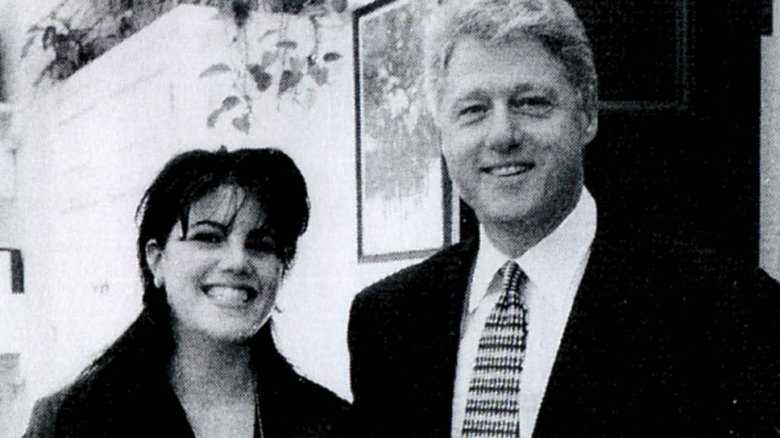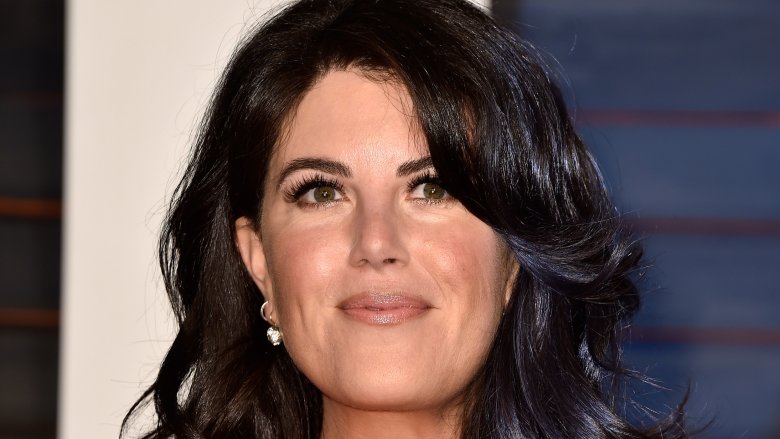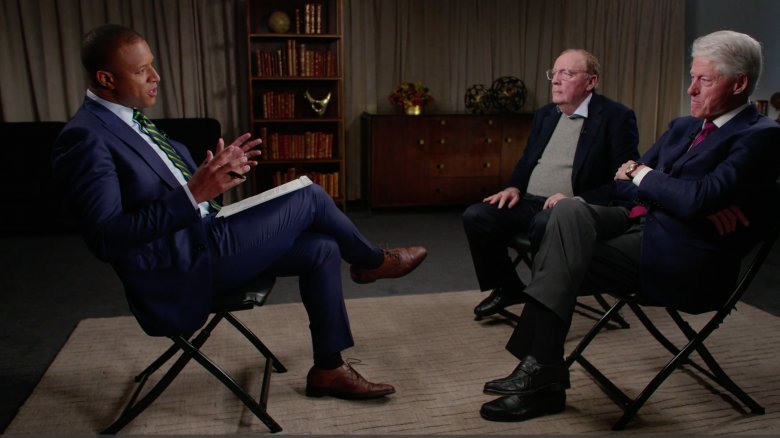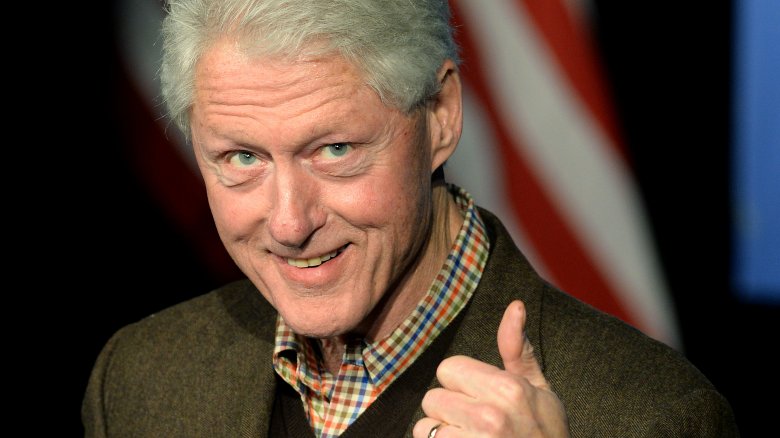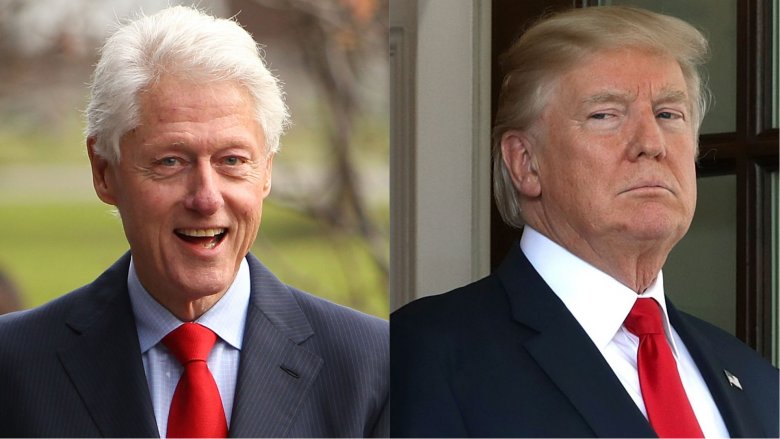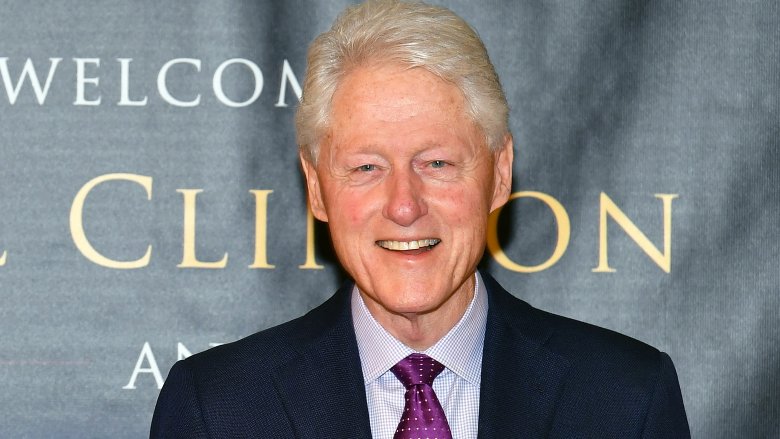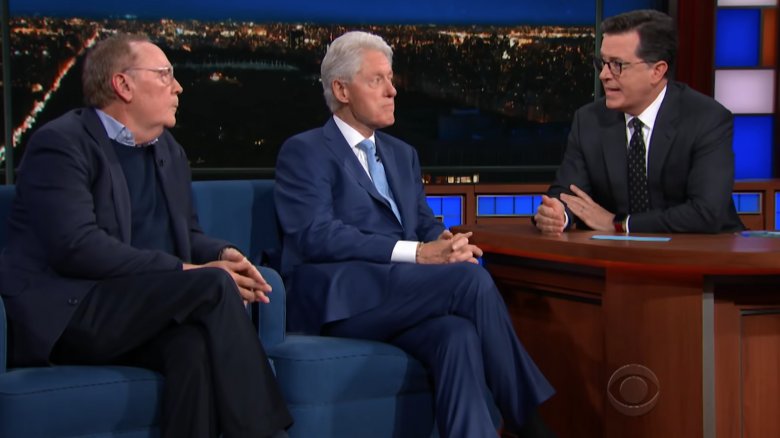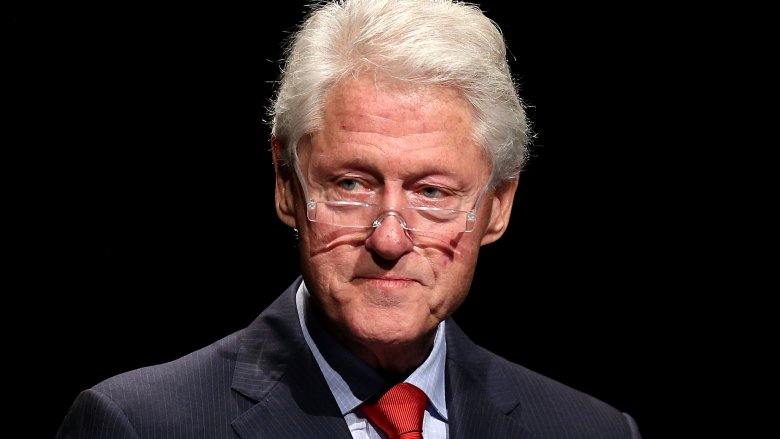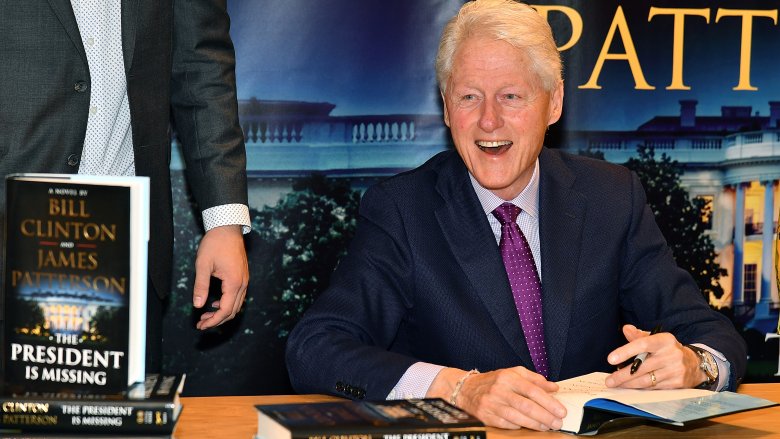The Most Uncomfortable Things Bill Clinton Has Said About The Monica Lewinsky Scandal
"I did not have sexual relations with that woman," President Bill Clinton infamously proclaimed in 1998, emphatically denying a relationship with then-25-year old White House intern Monica Lewinsky. Little did Clinton or Lewinsky know that federal investigators, led by independent counsel Kenneth Starr, had 20 hours of secret recordings of telephone conversations between Lewinsky and her co-worker Linda Tripp discussing the sexual affair she had with Clinton between 1995 and 1997. What transpired was one of the most notorious sex scandals of all time.
More than two decades after the affair, while on a book tour to promote The President is Missing, a political thriller Clinton co-wrote with best-selling author James Patterson, the former president found himself thrust into the midst of the #MeToo movement. Allegations about sexual misconduct among men exploiting their positions of power were being shouted from rooftops by once-silent victims, and Clinton was clearly not prepared.
From his catastrophic interview with NBC News to his intensely problematic language during future stops on the book tour, here are the most uncomfortable things Bill Clinton has said about Monica Lewinsky, the scandal, and by extension, the #MeToo movement.
Monica Lewinsky: affair was a 'gross abuse of power'
Before we jump into Bill Clinton's comments, let's take a moment to hear from Monica Lewinsky via the essay she wrote for Vanity Fair on the 20th anniversary of the Starr investigation. Reflecting on the "changing nature of trauma" and "the extraordinary hope now provided by the #MeToo movement," Lewinsky painfully recounted her years of isolation during a time when public perception and understanding of relationships between powerful men and young women was not as evolved.
Although Lewinsky said she regrets the role she played in the affair, she now understands that what transpired constituted a "gross abuse of power." She said, "He was my boss. He was the most powerful man on the planet. He was 27 years my senior, with enough life experience to know better."
Lewinsky revealed that she was diagnosed with post-traumatic stress disorder due to being "publicly outed and ostracized" and thanked the #MeToo movement for "the safety that comes from solidarity." She added, "I am in awe of the sheer courage of the women who have stood up and begun to confront entrenched beliefs and institutions."
Connecting the scandal to Starbucks, 'imagined facts,' JFK
Bill Clinton's book tour got off to a disastrous start when his interview with NBC News' Craig Melvin quickly turned contentious as the topic of discussion shifted to his former intern and to the #MeToo movment. Asked if he would have "approached the accusations differently" if the scandal happened today, Clinton became openly annoyed.
The former president brushed off the line of questioning, delving into a confusing response about "imagined facts," defending his decision to fight impeachment, and noting that the scandal was "litigated 20 years ago," and trying to shift the focus to Starbucks. Clinton also alluded to the notion that other presidents cheated too, asking Craig: "Do you think President Kennedy should have resigned? Do you believe President Johnson should have resigned?"
When asked if he did or should personally apologize to Lewinsky, Clinton responded: "I've never talked to her, but I did say, publicly on more than one occasion that I was sorry."
Playing the victim
Clinton's aggressive refusal to reassess the Monica Lewinsky scandal continued throughout the NBC News interview, and in a particularly terse moment, he somehow managed to paint himself as a victim, saying that he didn't get out of the debacle "for free."
"I left the White House $16 million in debt," he said, turning his ire on veteran journalist Craig Melvin. "But you typically have ignored gaping facts in describing this. And I bet you don't even know them." Clinton claimed two-thirds of Americans sided with him throughout the scandal.
Perhaps now would be a good time to point out that, even with a master's degree, Lewinsky has reportedly struggled to find steady employment. One organization even allegedly required "a letter of indemnification from the Clintons before it could hire her." She also apparently gets uninvited from events if Clinton decides to show up. While the consequences of her actions have been life-altering, Bill and Hillary Clinton have managed to rake in more than $240 million since leaving the White House in 2001.
Deflecting to Trump
When reporters confronted Donald Trump in October 2016 about his hot mic admission involving grabbing women "by the p***y," the then-presidential candidate deflected to a past president. "Bill Clinton has said far worse to me on the golf course — not even close," Trump said.
When pressed about his scandal being a prime target for reexamination through the lens of the #MeToo movement during the aforementioned interview with NBC News, the former president deflected to the current president. According to Clinton, Trump's alleged sexual behavior has not received "the coverage that you would expect." Clinton said Democrats are "frustrated that they've got all these serious allegations against the current occupant of the Oval Office, and his voters don't seem to care."
Clinton emerged from that high-profile television sit-down as a combative defender of his legacy and a man who seemed to believe he was the victim of a flawed narrative involving Monica Lewinsky. He was pressed to explain himself for the rest of his book tour, but every time he opened his mouth, Clinton only made it worse.
Tough questions make him 'hot under the collar'
Bill Clinton addressed his controversial NBC News interview during a subsequent book tour event. "I got hot under the collar because of the way the questions were asked," he said (via CNN).
The former president also took another stab at describing his feelings about the #MeToo movement, albeit in an arguably self-centered way. "I have always tried to support it in the decisions and policies that I advanced," he said. "Beyond that, I think it would be good if we could go on with the discussion."
Monica Lewinsky responded in her own subtle way to the renewed focus on the scandal and the man that changed her life. She shared her Vanity Fair article on Twitter along with a note: "grateful to the myriad people who have helped me evolve [and] gain perspective in the past 20 years."
Stephen Colbert tries to give him a do-over
Third time's a charm? Bill Clinton got another chance to revisit the Monica Lewinsky scandal when he appeared on The Late Show with Stephen Colbert. After some brief pleasantries, Colbert jumped right into that now-notorious NBC News interview, describing Clinton's response to the Lewinsky questions as "tone deaf" and asking the 42nd president if he'd "like a do-over" on his answer.
"It wasn't my finest hour ... that was a very painful thing that happened twenty years ago," Clinton said. "And I'd like to think that we're all getting better as we go along."
Colbert kept the pressure on, reminding Clinton that in the age of #MeToo, it "doesn't matter how long ago it happened." Colbert added, "You seemed offended to be asked about this thing when, in all due respect, sir, your behavior was the most famous example of a powerful man sexually misbehaving in the workplace of my lifetime."
Clinton blamed NBC journalist Craig Melvin's line of questioning, suggesting that's why he "seemed to be tone deaf."
You can't make folks 'miserable at work' like you used to
Clinton came under fire once again over statements he made about the Monica Lewinsky scandal during a June 2018 interview with PBS News Hour. After downplaying his friendship with #MeToo poster boy Harvey Weinstein, Clinton was asked if he thought Monica Lewinsky had "paid a higher price, a harder price" than he did. "Oh, I don't know," he said. "I think she paid quite a price."
The former president's most controversial statements came next. Host Judy Woodruff asked if the changing norms surrounding sexual harassment and assault are "a good thing." Clinton's answer? "Well, in general, I think it's a good thing, yes," he said. "I think the norms have really changed in terms of what you can do to somebody against their will, how much you can crowd their space, make them miserable at work."
That comment catalyzed another wave of backlash. "'Norms have changed about what you can do to someone against their will' is a hell of a sentiment," tweeted The New York Times White House correspondent Maggie Haberman.
"Bill, my dude, how about you stop talking," said Refinery29 reporter Andrea González-Ramírez.
What's the damage?
Have Bill Clinton's controversial reflections on the Monica Lewinsky scandal during his 2018 book tour damaged book sales?
According to Deadline Hollywood, The President is Missing was the No. 1 hardcover fiction title for the week ending June 9, 2018 — on the heels of all those disastrous soundbites — selling more than 147,000 copies. Penguin Random House spokesman Paul Bogaards said it's the "best hardcover start for a fiction title since 2016." Oh, and in a bidding war, Showtime acquired the rights to develop the novel into a series.
Regardless of how you feel about all this, Clinton has seemingly done a bit of soul searching and had a change of heart ... though not exactly the one you might expect. At a TimesTalks event in Manhattan June 2018, Clinton was once again asked if he "had reconsidered his interactions with Ms. Lewinsky as examples of sexual harassment or exploitation of power dynamics."
Clinton replied, "I've said all I have to say. I'm not going there." The audience cheered.

